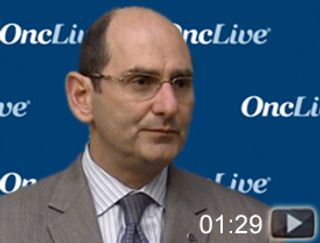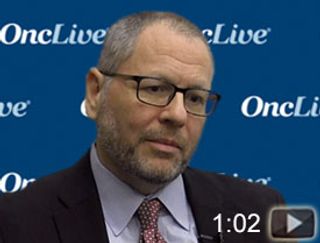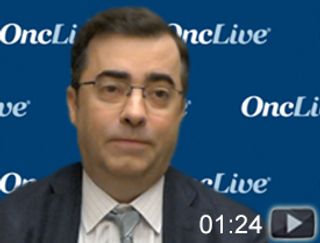
Genitourinary Cancers
Latest News
Latest Videos

CME Content
More News

Shilpa Gupta, MD, assistant professor, Hematology Oncology and Transplantation Division, University of Minnesota, discusses the shifting landscape of kidney cancer.

Andrew Vickers, PhD, attending research methodologist at Memorial Sloan Kettering Cancer Center, discusses the clinical value of MRI testing in prostate cancer.

Hans J. Hammers, MD, PhD, associate professor, Internal Medicine, UT Southwestern Medical Center, discusses the future of treatments for patients with renal cell carcinoma (RCC).
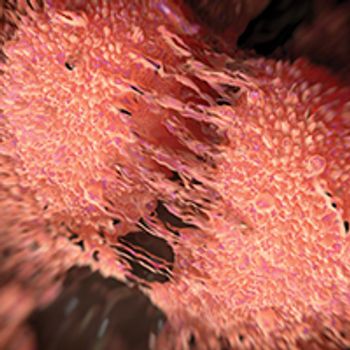
Patients with high-volume, castration-naïve metastatic prostate cancer may have superior progression-free survival outcomes when treated with early docetaxel.

Peter Black, MD, senior research scientist, Vancouver Prostate Centre, associate professor, Department of Urologic Sciences, University of British Columbia, discusses biomarker development in bladder cancer.

Jihad Kaouk, MD, urologist, Cleveland Clinic, discusses challenges regarding robotic surgery for patients with renal cell carcinoma (RCC).

Adam Scott Feldman, MD, MPH, urologist at Massachusetts General Hospital, assistant professor of surgery, Harvard Medical School, discusses managing patients with prostate cancer under active surveillance.

Costas Lallas, MD, professor at Sidney Kimmel Medical College, Thomas Jefferson University Hospital, discusses ongoing trials investigating immunotherapy regimens for patients with genitourinary malignancies.
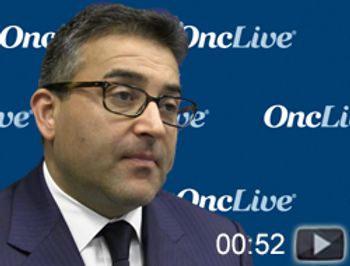
Simon Chowdhury, PhD, MA, MBBS, MRCP, consultant medical oncologist specializing in urological cancer, Sarah Cannon Research Institute, United Kingdom, discusses sequencing of immunotherapy regimens for patients with renal cell carcinoma (RCC).

Peter Black, MD, senior research scientist, Vancouver Prostate Centre, associate professor, Department of Urologic Sciences, University of British Columbia, discusses immunotherapy biomarkers in bladder cancer.

Shilpa Gupta, MD, assistant professor, Hematology Oncology and Transplantation Division, University of Minnesota, discusses adjuvant immunotherapy in kidney cancer.
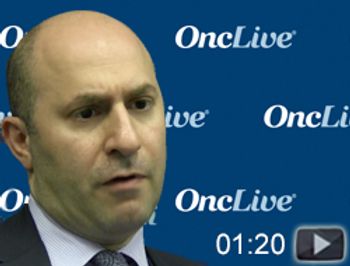
Toni K. Choueiri, MD, director, Lank Center for Genitourinary Oncology, director, Kidney Cancer Center, senior physician, Dana-Farber Cancer Institute, discusses trials investigating combinations for patients with renal cell carcinoma (RCC).

A comparison of the genomic risk profiles of patients with low-risk prostate cancer who are candidates for active surveillance against higher-risk patients, discovered that substantial genomic heterogeneity exists among patients with prostate cancer.

Toni Choueiri, MD, reflects on avelumab/axitinib results and other emerging combos in RCC.

Brian I. Rini, MD, professor of medicine, Cleveland Clinic, discusses the efficacy of pembrolizumab (Keytruda) and axitinib (Inlyta) combined in patients with renal cell carcinoma (RCC).

Jonathan E. Rosenberg, MD, medical oncologist at Memorial Sloan Kettering Cancer Center, discusses immunotherapy in patients with non-metastatic muscle invasive bladder cancer.

Peter Choyke, MD, FACR, chief of Molecular Imaging Program, National Cancer Institute, discusses which patients with prostate cancer benefit from active surveillance.

Jorge Garcia, MD, and Kim Chi, MD, share their insights on the LATITUDE trial in prostate cancer.

Primo N. Lara, MD, associate director for translational research, UC Davis Comprehensive Cancer Center, discusses the role of sunitinib (Sutent) for patients with renal cell carcinoma (RCC).

Michael B. Atkins, MD, deputy director, Georgetown-Lombardi Comprehensive Cancer Center, professor of oncology and medicine, Georgetown University School of Medicine, discusses sequencing of immunotherapy combination regimens for patients with renal cell carcinoma (RCC).

Primo N. Lara Jr, MD, discusses the KEYNOTE-037 pembrolizumab/epacadostat findings in patients with advanced RCC, and how the combination could change treatment in this population.

Arjun V. Balar, MD, assistant professor of medicine, Division of Hematology and Oncology, Perlmutter Cancer Center, NYU Langone Medical Center, discusses PD-L1 testing and the development of biomarkers for PD-L1 antibodies for patients with urothelial carcinoma.

Primo N. Lara, MD, associate director for translational research, UC Davis Comprehensive Cancer Center, discusses the potential role of IDO inhibitors in the treatment of patients with renal cell carcinoma.

Jorge Garcia, MD, Department of Hematology and Oncology, Cleveland Clinic, discusses the LATITUDE study in prostate cancer.

Andrew Vickers, PhD, attending research methodologist at Memorial Sloan Kettering Cancer Center, discusses the future of MRI in prostate cancer.











